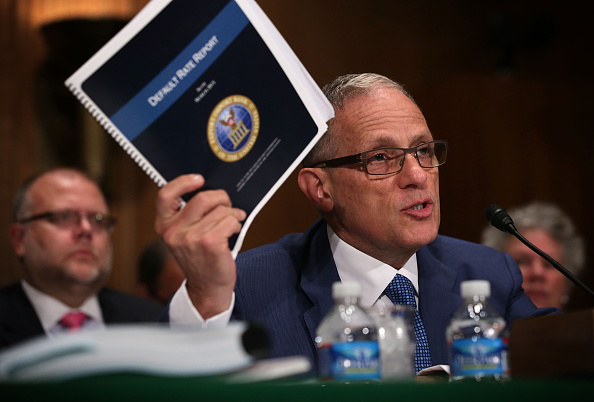
The chairman of the U.S. Export-Import Bank has spent a lot of time on Capitol Hill lately fighting to save his embattled institution. The bank, whose charter lapses June 30, has been the target of a coordinated campaign orchestrated by conservatives who call it a form of crony capitalism. Which means chairman Fred Hochberg has been shuttling between meetings with influential lawmakers, pleading with top House Republicans like Majority Leader Kevin McCarthy and Financial Services Chairman Jeb Hensarling to keep the credit export agency alive.
“I’m still confident that we are going to get reauthorized,” Hochberg told reporters Friday at a breakfast hosted by the Christian Science Monitor. But he acknowledged the possibility that it wouldn’t happen before the deadline, which would force supporters to find a way to revive the multi-billion dollar institution later on. “We’ve got some headwinds,” Hochberg conceded. “There is no plan B.”
The headwinds buffeting the obscure federal agency are a reflection of the forces reshaping Republican politics. In 2012, the bank was backed by big bipartisan majorities in both the House and Senate. And if the crusade to shutter it succeeds, it won’t be because lawmakers suddenly realized a bank that chiefly benefits big corporations like Boeing and General Electric didn’t mesh with the tenets of free-market economics.
Instead, it will be because the Ex-Im bank—which in 2014 provided about $20 billion in federal loan guarantees to support U.S. exports—has been denounced as corporate welfare by the deep-pocketed Koch political network, influential free-market think tanks and conservative interest groups. Organizations like Americans for Prosperity and the Club for Growth have launched direct-mail campaigns and TV ads to ramp up pressure on wavering lawmakers.
The same pressures loom large in the presidential race. In the early stages of the 2016 campaign, the expiration of the Ex-Im Bank has become a crucial litmus test for Republicans—and it’s no coincidence that nearly the entire field has wound up on the same side.
Scott Walker wants to see the bank’s charter lapse. So does Marco Rubio. Same goes for Ted Cruz and Rand Paul. Bobby Jindal? Ditto. Jeb Bush—who was once employed by a manufacturer that received $74 million in Ex-Im financing to sell water pumps to Nigeria—came out against the bank this winter. Rick Perry, who last year wrote a letter to Congress urging the bank’s reauthorization, was the latest to change his mind, publishing an op-ed in the Wall Street Journal that argued “the best way to mend Ex-Im is to end it.”
The rare defender of Ex-Im in the 2016 field is Sen. Lindsey Graham, whose home state of South Carolina is the site of a major Boeing plant that employs more than 7,500 people, according to company records.
Why has the bank has become unpopular among 2016 GOP contenders? In most cases, its foes can do more for presidential candidates than its friends. Ex-Im has powerful allies, from the major corporations who are beneficiaries to influential business groups like the U.S. Chamber of Commerce and well-funded trade associations. But the conservative ideologues pushing to kill the bank hold greater sway with the energized activists who can lift or sink a presidential prospect’s primary chances.
The Koch network alone plans to fork over nearly $900 million in the run-up to the 2016 election. It’s one reason why candidates seeking to win their favor have taken up against the bank. “The government should not be picking winners and losers when it comes to the free market,” Rubio said on a recent call organized by the Koch-based Americans for Prosperity.
Hochberg dodged a question about how the opposition of the 2016 field has affected the debate. “A small minority are opposed to us,” he said. But they are a powerful cadre of people, which is why the bank’s charter looks increasingly likely to lapse for the first time in 80 years.
More Must-Reads from TIME
- Donald Trump Is TIME's 2024 Person of the Year
- Why We Chose Trump as Person of the Year
- Is Intermittent Fasting Good or Bad for You?
- The 100 Must-Read Books of 2024
- The 20 Best Christmas TV Episodes
- Column: If Optimism Feels Ridiculous Now, Try Hope
- The Future of Climate Action Is Trade Policy
- Merle Bombardieri Is Helping People Make the Baby Decision
Write to Alex Altman at alex_altman@timemagazine.com